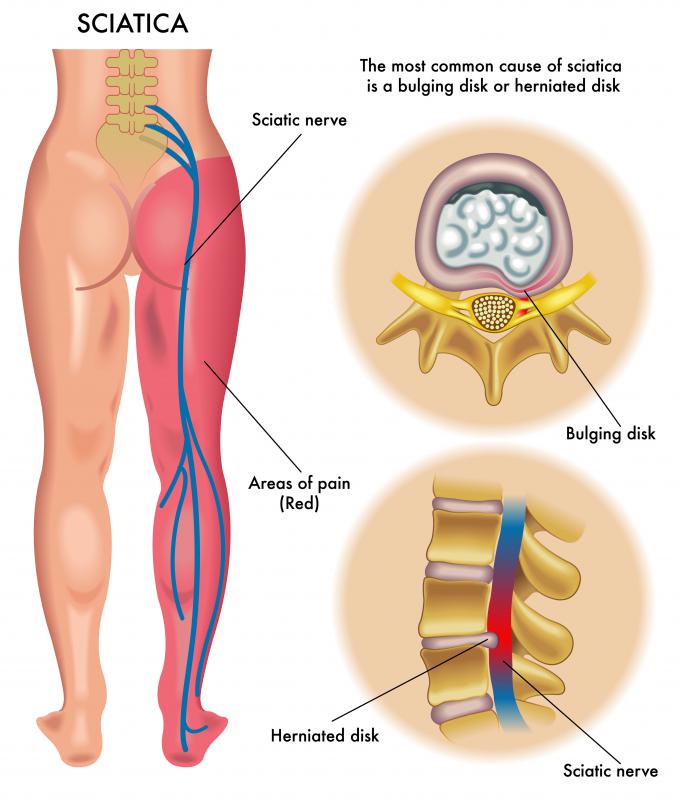At TheHealthBoard, we're committed to delivering accurate, trustworthy information. Our expert-authored content is rigorously fact-checked and sourced from credible authorities. Discover how we uphold the highest standards in providing you with reliable knowledge.
What is a Herniated Disc?
A herniated disc is a spinal abnormality, frequently the result of wear and tear on the body, or injury. It is referred to my many different names, which tend to be used interchangeably, although they may not be completely accurate. Some of the most common terms used to describe this condition are pinched nerve, ruptured disc, slipped disc and sciatica.
While these terms are widely used, technically, a pinched nerve is not the same as a herniated disc. It is in fact the result of a herniation, which causes the nerve to become pinched. It is therefore important to distinguish the two, in order for the doctor to locate the actual source of the pain and to treat it properly.

The term sciatica is casually used to describe many different types of back pain. However, sciatica really refers to the sciatic nerve, which generally causes lower back pain or pain in the legs. Sciatica, much like other pinched nerves, is often the result of a herniated disc.
While the lumbar spine or lower back is generally the most common site of herniated discs, it can be found anywhere throughout the length of the spine. It infrequently affects the thoracic spine, or upper back, but is common in the cervical spine, or the neck area. A herniated disc in the cervical spine can cause severe tension headaches, dizziness and mild to severe pain in the neck, shoulders and arms.

A healthcare provider must determine whether the patient's pain is the result of a pinched nerve or whether it is actual disc pain in order to give the patient true and lasting relief. Many times this will require an extensive study of the patient's medical history along with a physical examination. In some cases, diagnostic imaging is also necessary. An X-ray may not be enough, since it is unable to produce a complete image of a herniated disc, so a CT scan or MRI may be in order.

A herniated disc only requires surgery in the most extreme cases. It can usually be treated with rest, physical therapy, medications such as muscle relaxants, or simple, low impact exercise. In some cases, cortisone injections or other pain medication is indicated, but there are many alternative treatment options available.
AS FEATURED ON:
AS FEATURED ON:
















Discussion Comments
I have two herniated discs in my upper back and neck from a while back. Now at the age of 38, and really for the last three years, I have had horrible headaches that last for days, raised BP and numbness mostly on the right side of my face. My doc has done an MRI and CT scan of my head to rule out stroke and thankfully they came back negative, but I have to get rid of these headaches. Could it be from the herniated discs?
Tell me exactly how you would help me if I were to seek help for my back problem.
I have C67 disc herniation, spinal stenosis bone spurs. Constant aching of lower neck and shoulders,waking with numb arms and pin pricks in feet almost daily. Also, I have occasional, severe, lasting pain where I am immobile and cannot lift or move my head for days, and then a lot of pain in all areas radiating from c67 for weeks afterward, slowly diminishing back to my baseline which is a constant ache/burning. I have daily headaches.
my son has a herniated disc and has had the needles, is seeing a decompression doctor, has had x-rays, mri, etc., and the doctors say he is not a candidate for surgery. none of the medications work except to keep him sleepy. none relieve the back pain. What is the next step? He does not want surgery.
Is it normal to have a lamenectomy to repair a herniated disk?
Surgery isn't the only option to help with lower back pain from sciatica or disc herniations. Spinal Decompression has better results. I considered other options before letting a Doctor cut on my spine. It was expensive but well worth it. I go every 2 weeks for a spinal manipulation, just to keep me healthy. My Aunt had 8 back surgeries in the last 10 years and still can't get out of bed on her own. I was only 23 and didn't want to live a life the same way. I went to Spinal Aid.
Hello Melaineperry,
I was wondering if you received any answers or advice about your concern with your symptoms (sciatica..) I have the EXACT same symptoms and will start a post of my own as well but thought i'd try to touch base with you first. Please let me know if you've received any further information, thanks so much!
I have beed having some increased left lower back pain and buttocks pain with numbness and some tingling in my buttocks and left leg and calf. I also have been experiencing tingling sensations up the back of my head with occasional numbness on the left side of my face and also a twitching sensation on the left side of my face directly under my mouth. Does this souns like sciatica? I am only 25 and in okay health so this is a little freaky
Post your comments